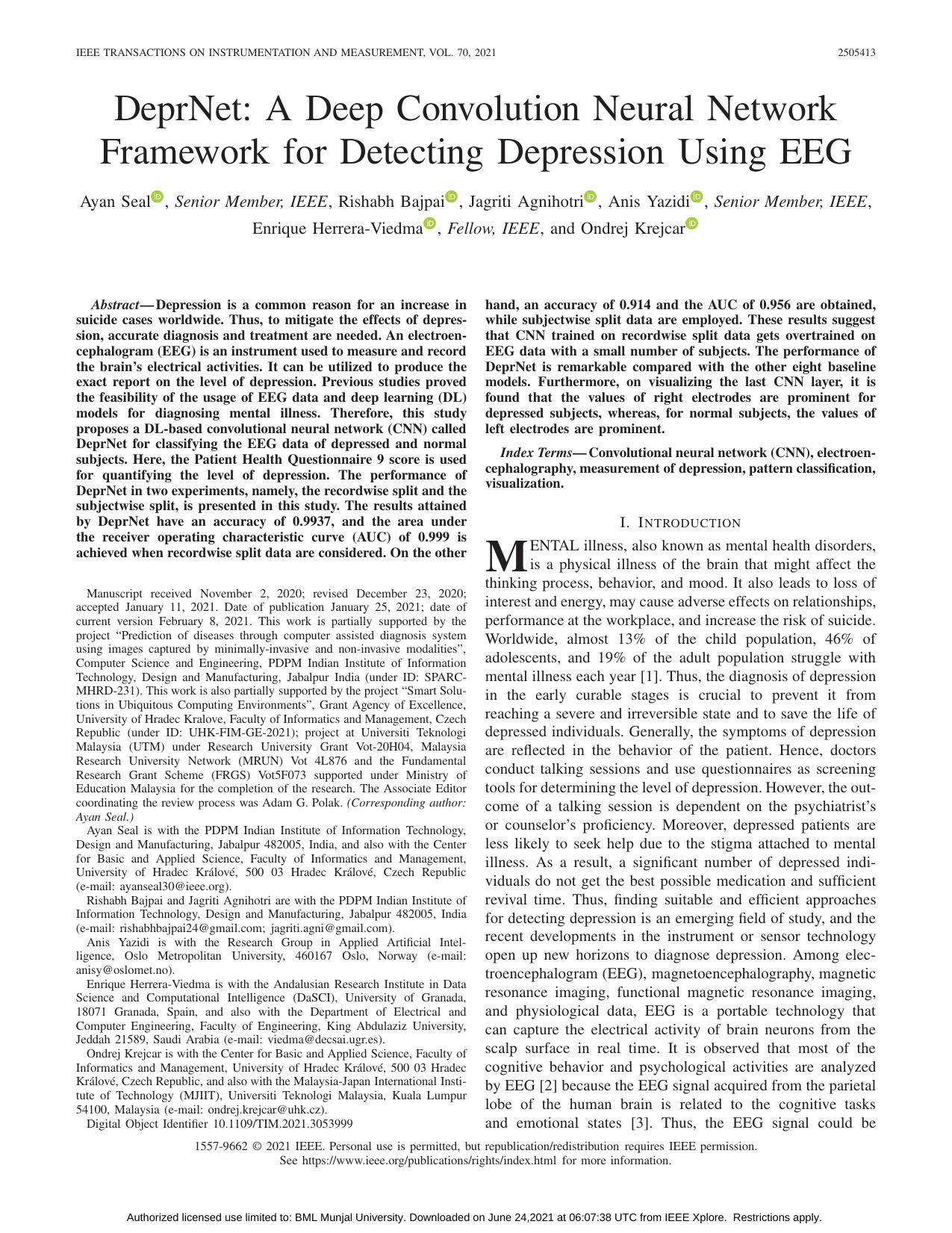Download DeprNet: A Deep Convolution Neural Network Framework for Detecting Depression Using EEG PDF Free - Full Version
Download DeprNet: A Deep Convolution Neural Network Framework for Detecting Depression Using EEG by Ayan Seal , Senior Member, IEEE, Rishabh Bajpai , Jagriti Agnihotri , Anis Yazidi , Senior Member, IEEE, Enrique Herrera-Viedma , Fellow, IEEE, and Ondrej Krejcar in PDF format completely FREE. No registration required, no payment needed. Get instant access to this valuable resource on PDFdrive.to!
About DeprNet: A Deep Convolution Neural Network Framework for Detecting Depression Using EEG
<p>Abstract— Depression is a common reason for an increase in</p><p>suicide cases worldwide. Thus, to mitigate the effects of depres-</p><p>sion, accurate diagnosis and treatment are needed. An electroen-</p><p>cephalogram (EEG) is an instrument used to measure and record</p><p>the brain’s electrical activities. It can be utilized to produce the</p><p>exact report on the level of depression. Previous studies proved</p><p>the feasibility of the usage of EEG data and deep learning (DL)</p><p>models for diagnosing mental illness. Therefore, this study</p><p>proposes a DL-based convolutional neural network (CNN) called</p><p>DeprNet for classifying the EEG data of depressed and normal</p><p>subjects. Here, the Patient Health Questionnaire 9 score is used</p><p>for quantifying the level of depression. The performance of</p><p>DeprNet in two experiments, namely, the recordwise split and the</p><p>subjectwise split, is presented in this study. The results attained</p><p>by DeprNet have an accuracy of 0.9937, and the area under</p><p>the receiver operating characteristic curve (AUC) of 0.999 is</p><p>achieved when recordwise split data are considered. On the other hand, an accuracy of 0.914 and the AUC of 0.956 are obtained,</p><p>while subjectwise split data are employed. These results suggest</p><p>that CNN trained on recordwise split data gets overtrained on</p><p>EEG data with a small number of subjects. The performance of</p><p>DeprNet is remarkable compared with the other eight baseline</p><p>models. Furthermore, on visualizing the last CNN layer, it is</p><p>found that the values of right electrodes are prominent for</p><p>depressed subjects, whereas, for normal subjects, the values of</p><p>left electrodes are prominent.</p><p>Index Terms— Convolutional neural network (CNN), electroen-</p><p>cephalography, measurement of depression, pattern classification,</p><p>visualization.</p>
Detailed Information
| Author: | Ayan Seal , Senior Member, IEEE, Rishabh Bajpai , Jagriti Agnihotri , Anis Yazidi , Senior Member, IEEE, Enrique Herrera-Viedma , Fellow, IEEE, and Ondrej Krejcar |
|---|---|
| Publication Year: | 2021 |
| Pages: | 10 |
| Language: | other |
| File Size: | 6.0908 |
| Format: | |
| Price: | FREE |
Safe & Secure Download - No registration required
Why Choose PDFdrive for Your Free DeprNet: A Deep Convolution Neural Network Framework for Detecting Depression Using EEG Download?
- 100% Free: No hidden fees or subscriptions required for one book every day.
- No Registration: Immediate access is available without creating accounts for one book every day.
- Safe and Secure: Clean downloads without malware or viruses
- Multiple Formats: PDF, MOBI, Mpub,... optimized for all devices
- Educational Resource: Supporting knowledge sharing and learning
Frequently Asked Questions
Is it really free to download DeprNet: A Deep Convolution Neural Network Framework for Detecting Depression Using EEG PDF?
Yes, on https://PDFdrive.to you can download DeprNet: A Deep Convolution Neural Network Framework for Detecting Depression Using EEG by Ayan Seal , Senior Member, IEEE, Rishabh Bajpai , Jagriti Agnihotri , Anis Yazidi , Senior Member, IEEE, Enrique Herrera-Viedma , Fellow, IEEE, and Ondrej Krejcar completely free. We don't require any payment, subscription, or registration to access this PDF file. For 3 books every day.
How can I read DeprNet: A Deep Convolution Neural Network Framework for Detecting Depression Using EEG on my mobile device?
After downloading DeprNet: A Deep Convolution Neural Network Framework for Detecting Depression Using EEG PDF, you can open it with any PDF reader app on your phone or tablet. We recommend using Adobe Acrobat Reader, Apple Books, or Google Play Books for the best reading experience.
Is this the full version of DeprNet: A Deep Convolution Neural Network Framework for Detecting Depression Using EEG?
Yes, this is the complete PDF version of DeprNet: A Deep Convolution Neural Network Framework for Detecting Depression Using EEG by Ayan Seal , Senior Member, IEEE, Rishabh Bajpai , Jagriti Agnihotri , Anis Yazidi , Senior Member, IEEE, Enrique Herrera-Viedma , Fellow, IEEE, and Ondrej Krejcar. You will be able to read the entire content as in the printed version without missing any pages.
Is it legal to download DeprNet: A Deep Convolution Neural Network Framework for Detecting Depression Using EEG PDF for free?
https://PDFdrive.to provides links to free educational resources available online. We do not store any files on our servers. Please be aware of copyright laws in your country before downloading.
The materials shared are intended for research, educational, and personal use in accordance with fair use principles.

